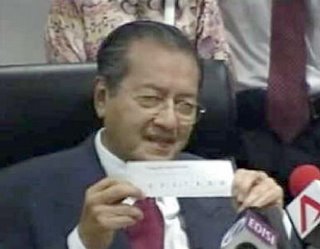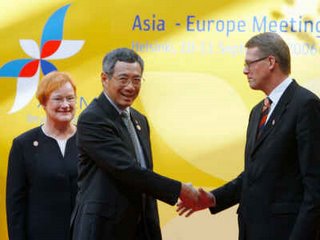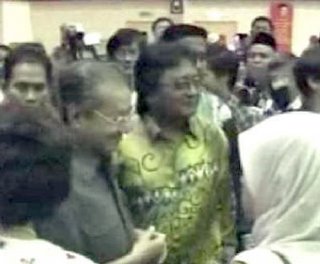Dr MAHATHIR DEFEAT >> INVESTORS RELIEF & GAIN; ABDULLAH in Helsinki ½ Hr Meet with SINGAPORE PM LEE HSIEN LOONG on Bilateral Win-Win Relationships

Since Dr Mahathir ignominious defeat as a delegate in last Saturday at his own stronghold for so many years, many investors are relief to know that he would no longer be able to meddle in the affairs of UMNO directly at the coming general assembly and the position of Datuk Seri Abdullah position is secured. And there are calls for him to “best exit like a statesman” (see below) but it would be difficult as his consciousness is “directing himself” and would not listen to advices of others.
And, if you believe, in very simple terms, that people mean you well, and will treat you kindly, they will. And, if you believe that the world is against you, then so it will be in your experience
Your events, your lives, your experiences, are caused by your present beliefs. Change the beliefs and your life changes.
You create your own difficulties. This is true for each individual. The inner psychological state is projected outward, gaining physical reality -whatever the psychological state may be. You cannot escape your own attitudes, for they will form the nature of what you see. If changes are to occur, they must be mental and psychic changes. These will be reflected in your environment. Negative, distrustful, fearful, or degrading attitudes toward anyone work against the self
The self-discipline learned the control, the compassion that is finally aroused, and that final and last lesson - the positive desire for creativity and love over destruction and hatred. When this is learned, the cycle is finished.
============================
Updated :
via www.biznewsdb.com
Sept. 12 (Bloomberg) -- When pressed by his supporters, Mahathir Mohamad had refused to reveal what he would say at the November meeting of the United Malays National Organization, the dominant party in
Now, we may never know.
In a weekend ballot, UMNO denied Mahathir a chance to address its annual assembly, handing a humiliating defeat to the 80-year-old statesman who had retired in 2003 after leading the party and the nation for more than two decades.
Investors ought to breathe a sigh of relief.
In recent months, Mahathir's relentless verbal attacks against his chosen successor and current Prime Minister Abdullah Ahmad Badawi, 66, had distracted the government and kept it from investing as boldly as it should have.
Although Mahathir insisted that his ``end game'' was merely to make the administration more transparent, many in the party were concerned that he would use the November meeting to foment discontent, if not a straight rift, among the rank and file.
The impasse had reached a point where the power struggle had begun to weigh on
Standard & Poor's said last week that Abdullah's position ``remains tenable.'' With its decisive action, UMNO has made it more secure. By placing Mahathir ninth among 15 aspirants in a contest that selected seven, the party gave a strong signal that it favored a quick return to business as usual.
Now it's up to Abdullah to move full steam on spending proposals, which will put more money in people's pockets. And he must do it before Mahathir discovers a new line of attack, for no one can be sure that the older leader has given up the fight.
Not Spending
V. Anantha-Nageswaran, head of research for Asia and the Middle East at Julius Baer Holding AG in Singapore, says he is waiting to see if Mahathir's defeat, a ``big relief'' for the incumbent administration, will lead to ``policy dynamism and coherence.''
The biggest concern is that the Malaysian government isn't spending enough.
The federal government's revenue in the first six months of 2006 grew 20 percent from a year earlier. Even then, it spent 1 percent less than last year. The overall fiscal surplus in the oil-producing nation was 4.3 percent of gross domestic product in the first half, compared with a 3.8 percent deficit last year.
Since landing the top job in October 2003, Abdullah has scrapped or postponed many of his predecessor's projects, including a bridge to neighboring
Mahathir has hit back by accusing Abdullah of favoring his family with government contracts, a charge the prime minister rejected in a televised interview last month.
Saving Proton
Mahathir also criticized the government's liberal auto import policy, saying it hurt state-owned Proton Holdings Bhd., which he had set up in 1982. The unprofitable carmaker is somewhere between the hospital and the mortuary.
After refusing to renew the contract of Chief Executive Officer Mahaleel Ariff last year and selling, for 1 euro ($1.27), a debt-ridden Italian motorcycle maker acquired under Mahaleel's leadership, Abdullah's government is now looking for a strategy to revive the company.
Mahathir questioned the asset sale and said Mahaleel had done a good job and should have been paid more.
As Mahathir went on the offensive, government ministries went slow in disbursing funds for public works.
In a more conducive political setting, the government would have been able to open its own purse strings more liberally to support a consumption boom that's looking jaded. Auto sales have posted six straight months of decline.
Slowing Consumption
The emerging slowdown in consumption is surprising for several reasons. For one, real interest rates are still negative. A one-year bank deposit in
And incomes are growing, especially for the 490,000 small palm and rubber planters, according to Lee Heng Guie, an economist at CIMB Securities Sdn.
Lee estimates that rubber planters will earn 52 percent more this year than in 2005. Meanwhile, local gasoline prices are about 18 percent cheaper than they would have been without a government subsidy, he says.
Even as consumption falters, second-quarter statistics show a large part of the growth coming from an inventory pile-up. Slowing global growth may force Malaysian companies to cut back production and liquidate stock, leading to a slowdown in gross domestic product.
Public Spending
``Government development spending needs to kick in,'' says Sanjay Mathur, a UBS AG economist in
The key lies in hastening the implementation of the Ninth Malaysia Plan, an ambitious 200 billion-ringgit ($54 billion) spending drive spread over five years. The 2007 budget for 9MP, as the plan is known, is 44.5 billion ringgit, a quarter more than this year.
The government this month announced a 2 percentage-point cut in the corporate tax rate, which is currently 28 percent. The reduction, which will be implemented over two years starting in 2007, aims to narrow the gap with
Improving
For now, investors and analysts would be happy just to see the money starting to flow again.
``The government has been unable to boost private consumption and investment,'' says Julius Baer's Anantha- Nageswaran. ``Until there are signs of that happening, we remain neutral to slightly negative on Malaysian assets, in general.''
(Andy Mukherjee is a Bloomberg News columnist. The opinions expressed are his own.)
Ties with Singapore 'very good, friendly'
Sep 12, 2006 The Straits Times
KUALA LUMPUR - MALAYSIAN Prime Minister Abdullah Badawi described ties with Singapore as 'very good' and 'friendly' in a recent interview.
He also said plans to develop the South Johor Economic Region were meant to 'complement' and not 'compete' with the Republic, and that it would be a 'win-win' situation. He was speaking in an interview published in the latest issue of The Edge.
Asked to describe ties with
'The bridge was just one item. There are other issues that need to be discussed and settled.' On Johor, he said the government wanted to build 'on the strengths that
'
He said
Mr Badawi also said that the southern Johor region would be driven by
http://asia.news.yahoo.com
Singapore, Malaysia should integrate economies for further growth: SM Goh
Tuesday September 12, 8:17 PM
Senior Minister Goh said Singapore and Malaysia should find ways to integrate the two economies. Mr Goh believed both countries stand to gain tremendous benefits with this economic arrangement.
Responding to comments Malaysian Prime Minister Abdullah Badawi made in a recent interview about bilateral relations, SM Goh said he agreed with Mr Abdullah that
"Certainly, I would encourage Prime Minister Abdullah to work with Prime Minister Lee Hsien Loong, who is fairly new as a prime minister in
outstanding but look forward into the future," urged Mr Goh.
One contentious issue had been the Causeway, but Mr Goh believed that was not the only physical bridge that connects the two countries.
"In later years, there could be other bridges. Maybe 20 to 30 years down the road, we should actually think of a bridge linking
With such long term thinking, Mr Goh believed the future bridge can stimulate further growth along the east coast of Johor.
- CNA /ls
From Abdul Muin Abdul Majid The President of Finland, Tarja Halonen (l.), and the Prime Minister of Finland, Matti Vanhanen (r.), welcome the Prime Minister of Malaysia, Dato’ Seri Abdullah Ahmad Badawi (ABOVE) and Prime Minister of Singapore, Lee Hsien Loong (BELOW) to the ASEM 6 Summit in Helsinki on Sunday, 10 September.![]()


Alluding to his bilateral meeting with Singaporean Prime Minister Lee Hsien Loong on the sidelines of the Sixth Asia-Europe Meeting (Asem6), Abdullah said he took the opportunity to explain to Lee the RM15 billion southern Johor development corridor project.
"The meeting was about our bilateral relation with the hope that it would not be affected by the recent decision not to go ahead with the bridge project," he told Malaysian journalists covering his visit to Helsinki for the biennial Asia-Europe dialogue which was launched in Bangkok in 1996.
Abdullah said that he explained to his Singaporean counterpart that the proposed development in southern Johor would be akin to the one seen in
This, he said, would create a more dynamic region that would help lure foreign investors.
On his talks with British Deputy Prime Minister John Prescott, Abdullah said that enhancing economic as well as educational and tourism ties were touched upon.
He said that linkages in the field of education were good with many top British universities operating branch campuses in
"But we'd also like to see more British students opting to study at our institutions of higher learning," he added.
Turning to his discussions with Romano Prodi, Abdullah said the Italian prime minister spoke about the need to increase tolerance among people of various religions.
"He commended
In addition,
Tuesday September 12,
Singapore, Malaysia can move forward in bilateral relations: PM Lee
This was the assessment after Prime Minister Lee Hsien Loong met his Malaysian counterpart, Abdullah Ahmad Badawi, on Sunday.
Both leaders met on the sidelines of the two-day Asia-Europe Meeting, or ASEM, in
Mr Lee was speaking to the
PM Lee said he had a good meeting with Mr Abdullah, where they discussed bilateral ties.
On building closer cooperation, Mr Lee said Mr Abdullah brought up the developments in
He said: "He described what he was doing in
Mr Lee said both also touched on cooperation in ASEAN.
He gave Mr Abdullah an account of his recent trip to
Mr Lee told the Malaysian Prime Minister that it was vital to get the region on the map.
PM Lee said: "So he said yes, he goes around, he tells people this is a market of 530 million but it has to be seen as one and not as 10 and that means we have to get our integration, which we're talking about 2015, but we should really work on the way to 2015 and we're talking about the ASEAN Charter.
"The eminent persons group is working, so we should strengthen our institutions and make them effective, which is one of the reasons why in the Asia-Europe Summit meeting, participants, the enlargement, we're going to bring in not just new countries from
It was announced at the ASEM summit that countries like
Mr Lee said he had a good exchange of views with Mr Abdullah during a one-on-one meeting lasting about half an hour.
Both had not met each other privately for some time.
The last time both men saw each other was in Best to exit like a statesman; Zainon Ahmad; from SUN When the tears have dried up and the disappointment and anger have subsided, Tun Dr Mahathir Mohamad should console himself with the thought that it was love that killed his bid to cry to the Umno general assembly this November. He should be grateful that in the twilight years of his life and three years after he relinquished power to a successor of his choice, he is still so much loved by party members that they refused to allow him to make a spectacle of himself at the assembly. And what is more consoling is the knowledge that among those who want him to attend, but only as a dignified and respected guest and a VVIP, are International Trade and Industry Minister Datuk Seri Rafidah Aziz and Minister in the Prime Minister's Department Datuk Seri Nazri Aziz. Rafidah has been the target of his criticisms and scorn over the AP issue while Nazri had thrown back on behalf of Prime Minister Datuk Seri Abdullah Ahmad Badawi the barbs Mahathir intended for his successor when the latter was maintaining his "elegant silence". A scene at a gathering in a house in Kubang Pasu on Thursday evening saw a speaker saying: "As he had been our respected division and national leader and benefactor for two decades, do we want to allow him in his old age - when he is probably incapable of making the right decision anymore - to become a delegate and to suffer all manner of indignities? We must protect him and shield him." Indeed, that had been the role adopted by some newspaper editors occasionally in the days when he was the prime minister: to protect Mahathir from his own excessive vehemence and to make Mahathir look good. But the party voters of Kubang Pasu - his own ward where many of his old friends from his pre-war Pekan Rabu days live and where he had showered them with all manner of lavishness and attention - were persuaded to the thinking that they must protect him. But to Mahathir, a veteran practitioner of the Machiavellian art, this argument does not wash. He had been too much of a politician to accept anything other than what happened in Kubang Pasu as realpolitik. To him the grim reality is that he had made his bid to be elected a delegate and had lost. He must be chagrined to know that he was defeated by the very Umno patronage system that he had helped to nurture and had perfected during his 22 years as leader of the party - a party he re-created in his own image in 1987. Mahathir had, thus, been stopped in his tracks in his bid to embarrass the party leadership by sitting - he, being a prime minister and party president for more than two decades - among the ordinary delegates. For certain, had he won, he would never fail to get the attention of the delegates every time he walked up or down the aisle as he made his way to his seat or made an exit out of the hall. Ah, they are up there, so grand, while we are here listening to all their spin. That is enough even if he failed to get the chance to speak. If he gets the opportunity to speak - and he will certainly try to grab it - it is a bonus as more will be able to hear what he has been saying all this while and, who knows, even more. And this is what many in Umno and outside fear. Ever since he came out to speak openly against the administration of Abdullah, the unity of the party has been somewhat shaken. But by attending the assembly as a delegate he would only deepen the split further and embarrass Abdullah. Already there is concern among businesses and investors who are quite rattled by the row and are afraid that they are in for a period of political instability. So it must have been a huge relief to many people - in as well as outside of the party - after it was announced shortly after It is interesting to speculate whether in his single-mindedness to be a delegate to the assembly he ever considered the possibility of being jeered should he rise to speak unbidden and the pandemonium that would break out should those who support him jeered back. We wonder whether it also crossed his mind that it could very well happen and he would go down in history as the man who had caused the normally orderly Umno assembly to descend into chaos and violence. But all that concern seems unfounded now. By not being a delegate on Saturday he will never be a source of embarrassment to the leaders of the party and the assembly this November. Better still for everyone concerned if he did not attend at all - even as a guest. Like Harold Macmillan said when resigning his seat in the House of Commons a year after stepping down as British prime minister: "When the curtain falls, the best thing an actor can do is to go away."
0 Comments:
Post a Comment
<< Home